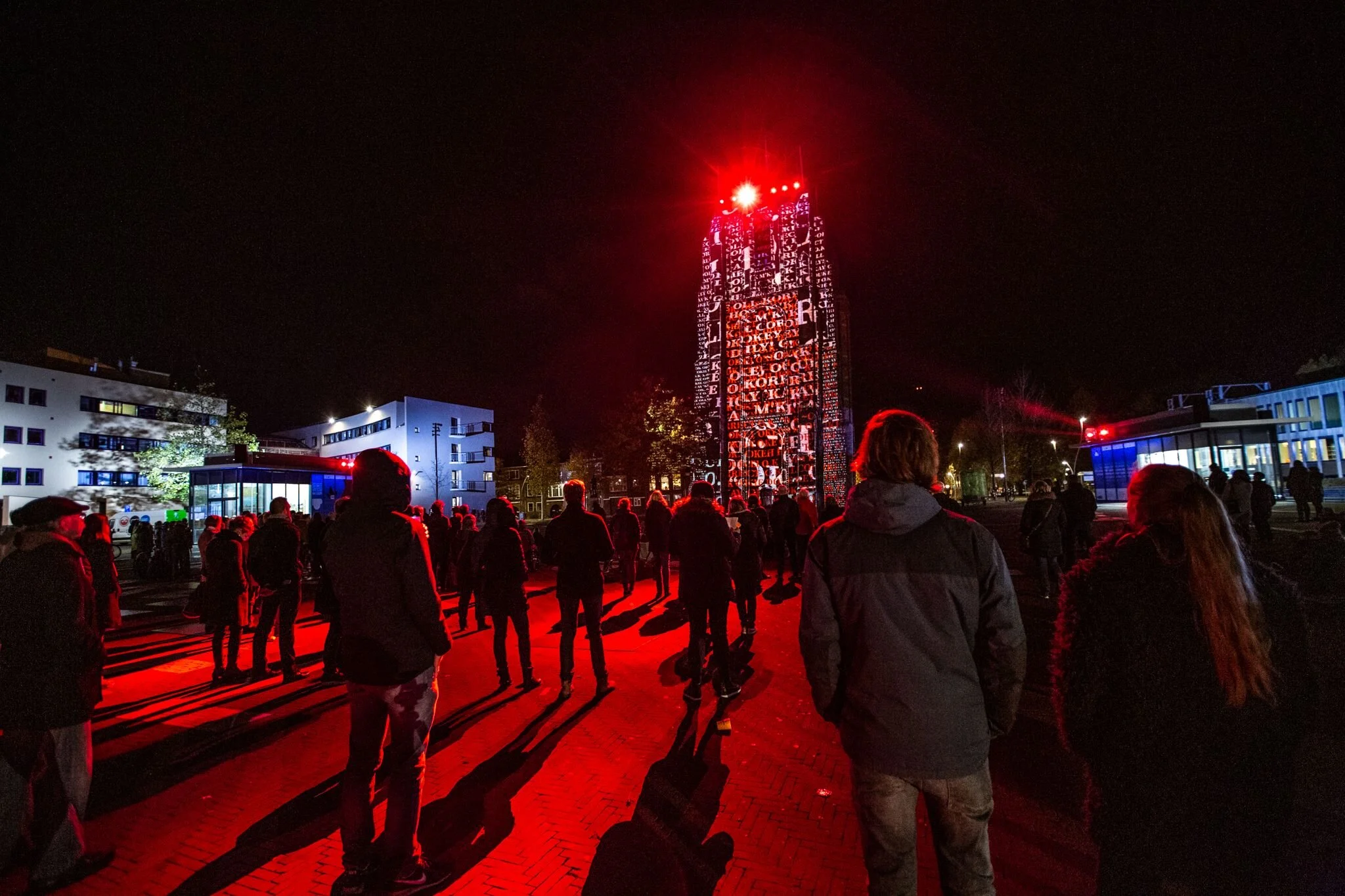
LEEUWARDEN
What is Friesland? What is Frisian?
Leeuwarden is the capital of Friesland (Fryslân), and part of the Kingdom of the Netherlands, one of its twelve provinces. Slightly over 650,000 people live in Friesland. What distinguishes this region in particular from the rest of the Netherlands is the Frisian language (Frysk). The majority of the inhabitants are used to using two or more languages alongside each other, and alongside Dutch, Frisian is also to a limited extent the language of administration. Most inhabitants of Friesland understand the language (97%), almost three-quarters speak Frisian and for over fifty percent Frisian it is their mother tongue. Approximately two-thirds of the population can read Frisian but on their own testimony only a quarter can also write the language. Besides Frisian and Dutch, various (Frisian-influenced) Dutch dialects are in use in Friesland.
“In Leeuwarden, you can walk over poems that have been carved into large slabs of Belgian blue stone. Together the poems form a poetry route through the city.”
J.J. Slauerhoff
THE END
Once, when I lived deep in the land
Insatiable woe gnawed at me,
A vulture at my liver,
and I knew: from all nations I was banned.
So I took to the distant sea.
But now that I have travelled far
And sailed alone on the oceanwide
Where even Da Cunha does not mar
The blank horizon’s endless bar
I feel a tugging, like a tide,
To the distant, constant, russet land,
And I know: there is no rest for me.
Not on this earth, nor on the sea,
Until I reach my final quay
Of boards in sand.
Translated by David McKay
Lucas Kemper Projecties, Oldehove tower
Swallows and floating Horses. An Anthology of Frisian Literature. Edited by Ernst Bruinsma, Alpita de Jong and André Looijenga.
Swallows and Floating Horses, the title is taken from a poem by Tsjêbbe Hettinga, is a comprehensive bilingual anthology of Frisian literature, including nearly a hundred and fifty poems and prose extracts from all historical periods and areas where Frisian is spoken and written, accompanied by new translations into English by a group of respected translators
Frisian is the language most closely related to English, as popular-scientific books on the history of English tell us. In earlier times fishermen from East Anglia knew that the language of the coastal regions on the other side of the North Sea closely resembled their own: “Bread, butter and green cheese / is good English and good Friese.” And in Frisian the best-known rhyme about the Frisian language begins with similar words: Bûter, brea en griene tsiis...
Although historically close to English, Frisian is in many respects its antipode: a language that kept small, that stayed at home, that for a long time was scarcely written down, and many speakers of which today are trilingual. Apart from the famous horses, cows and dairy products, however, the Frisians also have a written tradition spanning eight centuries, during which Frisian repeatedly refused to die out, but kept reinventing itself and slowly built up a literature of its own. In this anthology–the first dual-language Frisian/English historical anthology of both Frisian poetry and prose–the story is told of the Frisian language, its speakers and the literature they wrote in their language.
Sleeper
I love the sound of a train in the distance
when I’m dozing in bed high over the city.
The engine casts out its racket like coals
over cliffs as black as diesel oil.
Derailed sighs rise,solidifying on the northerly.
The noise is a woman,
her cries raw and bent.
Can you lend her some cash
to drown an old debt?
She’s good for it,
she’ll promise you that.
Her house is a port,
a quay for every man.
She hums her prayer on the northerly
washing empty mirrors out to sea.
I love the chugging of trains in the distance.
Lift me up, put me down
Lift me up, put me down
The chugging, the lugging of pots and of pans
the clanging acoustics of wide-awake kitchens
and trucks turning in from a rain-heavy road
to a yard with a load from unhappier days.
Leave me here, take me too
Leave me here, take me too
I love the chug of a train in the distance.
The sound is a child
who cries for his mother.
Can the morning be his,
can he leave without trace?
He’ll go to bed now,
he’ll promise her that.
His body smells of diesel oil
and his head is a railway station.
Tracks drift off and up like stairs,
the sky the next stop on the way.
Sighs rise, echoing over gates and turnstiles,
the click-clack of weathered cargo in creepers
covering towers and power stations, sheds and back fences,
the brick and stone clods of a hollow city.
I love the sound of a train in the distance.
Arjan Hut (Translation: David Colmer)
Lucas Kemper Projecties, Oldehove tower



